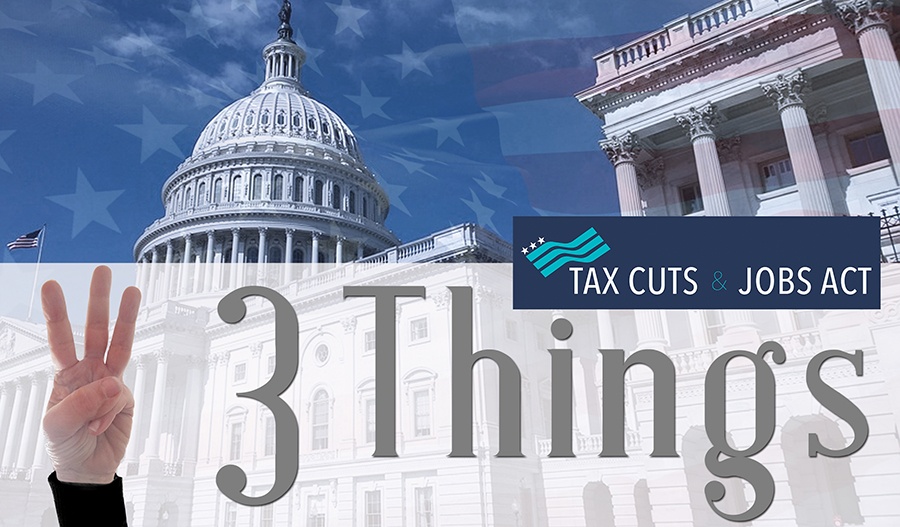
3 Things: The Tax Cuts and Jobs Act
The Tax Cuts and Jobs Act of 2017
Senate Republicans passed their tax reform bill in the wee hours last Saturday morning. Senate Majority Leader Mitch McConnell told reporters that the GOP tax bill would pay for itself. Independent analysis rejects this notion.
Next step: turning two bills into one. When chambers pass different versions of a bill, conferees appointed from both the House and Senate meet to reconcile the bills they each passed into one measure that can pass both chambers again. Lawmakers are confident they can finish this month.
At SAGEbroadview, we integrate tax planning throughout our client’s financial life planning. Accordingly, we continue to monitor developments so we can understand the potential impact of the tax bill on our clients.
Important Differences Between the House and Senate Tax Bills
- This article by the Tax Foundation, an independent tax policy research organization, covers the major differences between the House and Senate versions. Provisions addressed on the list include: child tax credits, medical expense deduction, mortgage interest deduction, alternative minimum tax (AMT), and estate tax.
Important Differences Between the House and Senate Tax Reform Bills Heading into Conference (Tax Foundation, 12/2/2017)
Additional Reading (with details on other provisions including: state & local income tax deduction, property tax deduction, graduate student tuition waivers, and 529 plans.): From Tax Rates to Deductions: comparing the House & Senate Bills to Current Law (Kelly Phillips Erb, Forbes, 12/3/2017).
Also, 21 Ways the House and Senate Tax Bills May Affect You and Your Pocketbook (Kiplinger, 12/2/2017)
Potential Effect on the Housing Market from the Tax Cuts and Job Act
- Proposed changes to the mortgage interest deduction and the capital gains exclusion for selling your home may be good for tax policy. They may not be good for home values. The National Association of Realtors (NAR) is predicting that homeowners in New Jersey, Connecticut, Illinois, New Hampshire, Maryland, Rhode Island, Virginia, Wisconsin, Georgia, Minnesota, New York, Ohio, Pennsylvania, and Texas (in order of sharpest decline with New Jersey most impacted) would see the sharpest dives in home values. Estimates range from 10% on the low end to 21% at the high end.
Realtors Predict Tax Bill Will Cause Housing Prices To Drop In Every State (Kelly Phillips Erb, Forbes, 12/3/2017)
Additional Reading: The GOP is set to eliminate one of the biggest benefits of owning a home (Business Insider, 12/4/2017)
Republican Tax Bill Could Be Detrimental to Charitable Giving (and to Retired Investors)
- With the doubling of the standard deduction, fewer taxpayers would itemize – which is the only way to take advantage of the deduction for charitable contributions.
Additionally, the Senate bill eliminates an individual investor’s ability to pick specific tax lots when selling stocks, forcing individual investors to use FIFO– First In, First Out. The FIFO method sells oldest shares first. These are usually the shares with the biggest embedded capital gains, and typically the best lots to use when gifting stock to charity. The lots with the largest gains are usually not the ones you want to sell when raising cash for spending needs because this often increases your tax bill.
For holdings in a taxable mutual fund, under the Senate bill, investors could continue to apply the average cost of shares method.
The tax bill passed by the House did not include the mandatory FIFO provision.
Boost your charitable giving this year, in case the GOP tax bill becomes law (Sarah O’Brien, CNBC, 11/28/2017)
Additional Reading: How the Tax Rewrite Could Impact Charitable Giving – United Way CEO talks with NPR (NPR, 12/3/2017).
Also, Senate FIFO Proposal Punishes American Investors (Wealth Management, 12/4/2017) and Oppose ‘Mandatory FIFO’ in Tax Plan (Investment Adviser Association)
 Secure Document Sharing
Secure Document Sharing


